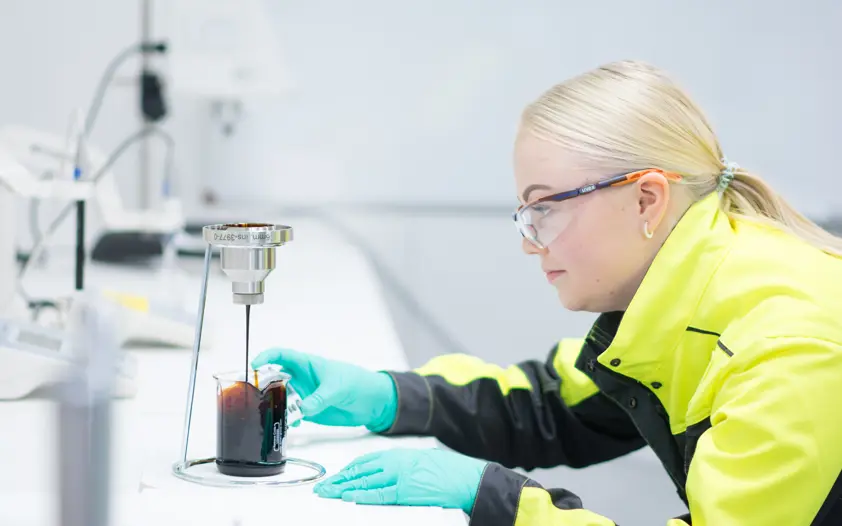As a researcher in analytical services and method development at UPM’s R&D centre, Saara Laamanen is continuously working on improving and developing both products and processes.
For the 24-year-old recent graduate from the Lappeenranta University of Technology, the job is pretty much a career dream come true.
“This is my first real job apart from summer jobs and being able to continue working with the same themes as during my studies is spot-on what I wanted at this stage of my working life,” she says.
“It’s a job that’s never completed, so it feels good to know there are plenty of opportunities in the future.”
However, in her teenage years, Laamanen wasn’t sure she’d go for science, let alone chemical engineering. The reason she studied advanced mathematics, chemistry and physics was because she enjoyed practical subjects more than reading and writing essays.
“I’m glad I did, too. Had I not chosen to study these subjects at an advanced level, it would’ve been much more difficult for me to pursue a career in technology later on,” says Laamanen.

Saara Laamanen believes more women would be interested in the fields of science, technology, engineering and mathematics if they were encouraged from an early age.
World-savers wanted
Many young women are like Laamanen: technology and engineering just might not be on their radar as they are considering career options. This is a pity because the shortage of skilled technology professionals is an international problem; and despite the constantly growing job market, girls and women don’t seem to be aiming for degrees that would help them take up these new jobs, as was pointed out in a study released by Microsoft last year.
Laamanen believes that if only girls – and young people, in general – understood the impact science has on the direction our societies are taking, they’d be much more inclined to get involved.
“A 15-year-old often has no clue as to what different types of engineers do for a living,” she says. “Many people studying advanced sciences tend to aim for medical school and might not understand it’s far from being the only option.”
One major factor, according to the study by Microsoft, is girls not knowing how studying science, technology, engineering and maths can lead to having a positive impact on the world. However, even a little exposure to actual applications of the knowledge can dramatically change this outlook. Laamanen just wishes this message was delivered earlier in education.
“At universities, I believe they succeed at conveying how important science is to better the world through, for example, battling climate change and making safer and more efficient use of resources, but for some, that’s already too late,” she says. “I do feel like my job has a meaning and that I can make a difference.”
Safety, sustainability, diversity
Laamanen admits that during her first two years of upper secondary school, she wasn’t particularly fussed about her future studies. Thus, she deems herself lucky as she didn’t give up on science subjects, despite not being entirely sure how she’d make use of them later in life.
Laamanen encourages schools to begin career coaching earlier and focus on what skill sets are needed in the future – and what for. She also emphasises that the real-life experiences of budding professionals are useful for young students trying to figure out what to do next.
For Laamanen, it’s obvious that women are just as needed as men to make our ways of life safe and sustainable, and she has never been discriminated against at work due to her gender or young age.
“It benefits everyone to have a diverse group of people around. Together, we can find new angles and points of view and stop taking our own ways for granted.”
Text: Anne Salomäki
Photos: Ville Vauhkonen

